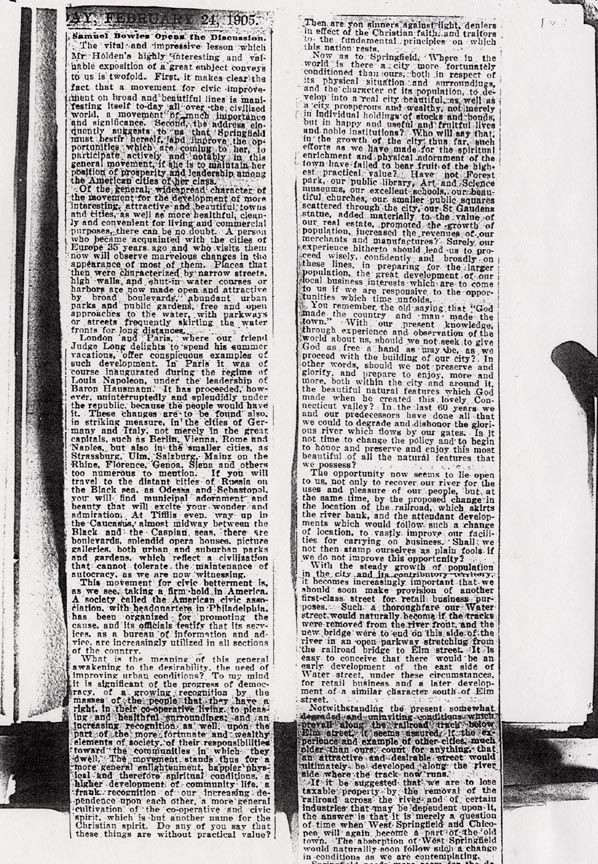
DAY, FEBRUARY 24, 1905.
Samuel Bowles Opens the Discussion.
The vital and impressive lesson which
Mr Holden's highly interesting and val-
uable exposition of a great subject conveys
to us is twofold. First, it makes clear the
fact that a movement for civic improve-
ment on broad and beautiful lines is mani-
festing itself to-day all over the civilized
world, a movement of much importance
and significance. Second, the address elo-
quently suggests to me that Springfield
must bestir herself, and improve the op-
portunities which are coming to her, to
participate actively and notably in this
general movement, if she is to maintain her
position of prosperity and leadership among
the American cities of her class.
Of the general, widespread character of
the movement for the development of more
interesting, attractive and beautiful towns
and cities, as well as more healthful, clean-
ly and convenient for living and commercial
purposes, there can be no doubt. A person
who became acquainted with the cities of
Europe 35 years ago and who visits them
now will observe marvelous changes in the
appearance of most of them. Places that
then were characterized by narrow streets,
high walls, and shut-in water courses or
harbors are now made open and attractive
by broad boulevards, abundant urban
parks and public gardens, free and open
approaches to the water, with parkways
or streets frequently skirting the water
fronts for long distances.
London and Paris, where our friend
Judge Long delights to spend his summer
vacations, offer conspicuous examples of
such development. In Paris it was of
course inaugurated during the regime of
Louis Napoleon, under the leadership of
Baron Hausmann. It has proceeded, how-
ever, uninterruptedly and splendidly under
the republic, because the people would have
it. These changes are to be found also,
in striking measure, in the cities of Ger-
many and Italy, not merely in the great
capitals, such as Berlin, Vienna, Rome and
Naples, but also in the smaller cities, as
Strassburg, Ulm, Salzburg, Mainz on the
Rhine, Florence, Genoa, Siena and others
too numerous to mention. If you will
travel to the distant cities of Russia on
the Black sea, as Odessa and Sebastopol,
you will find municipal adornment and
beauty that will excite your wonder and
admiration. At Tifflis even, way up in
the Caucasus, almost midway between the
Black and the Caspian seas, there are
boulevards, splendid opera houses, picture
galleries, both urban and suburban parks
and gardens, both urban and suburban parks
and gardens, which reflect a civilization
that cannot tolerate the maintenance of
autocracy, as we are now witnessing.
This movement for civic betterment is,
as we see, taking a firm hold in America.
A society called the American civic asso-
ciation, with headquarters in Philadelphia,
has been organized for promoting the
cause, and its officials testify that its serv-
ices, as a bureau of information and ad-
vice, are increasingly utilized in all sections
of the country.
What is the meaning of this general
awakening to the desirability, the need of
improving urban conditions? To my mind
it is significant of the progress of democ-
racy, of a growing recognition by the
masses of the people that they have a
right, in their co-operative living, to pleas-
ing and healthful surroundings; and an
increasing recognition as well, upon the
part of the more fortunate and wealthy
elements of society, of their responsibilities
toward the communities in which they
dwell. The movement stands thus for a
more general enlightenment, happier phys-
ical and therefore spiritual conditions, a
higher development of community life, a
frank recognition of our increasing de-
pendence upon each other, a more general
cultivation of the co-operative and civic
spirit, which is but another name for the
Christian spirit. Do any of you say that
these things are without practical value?



